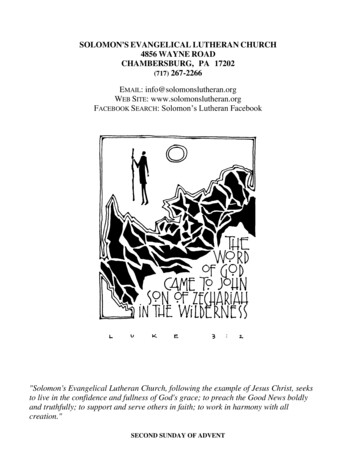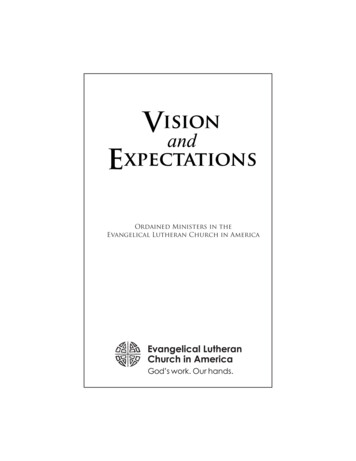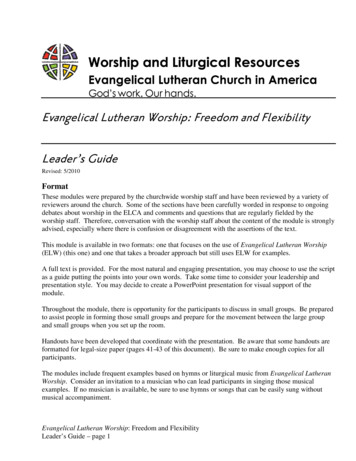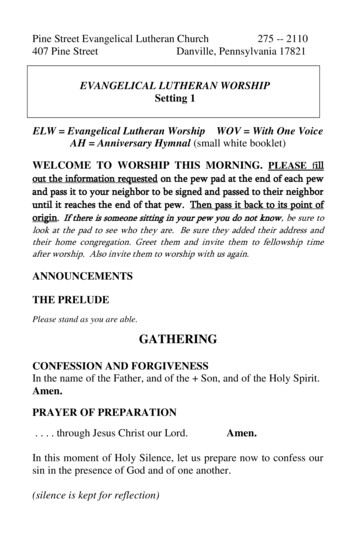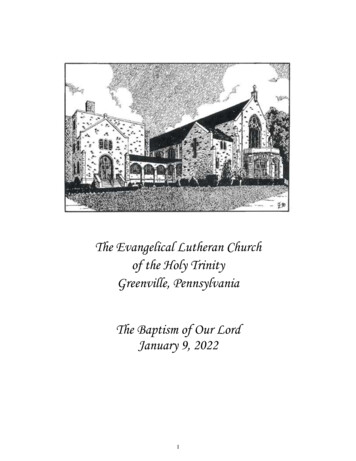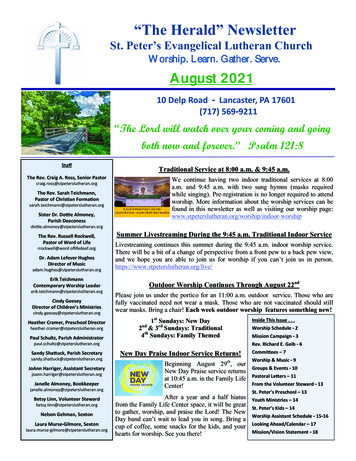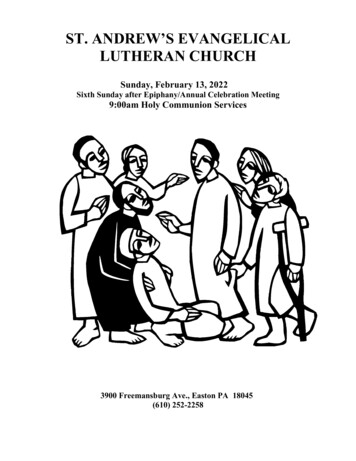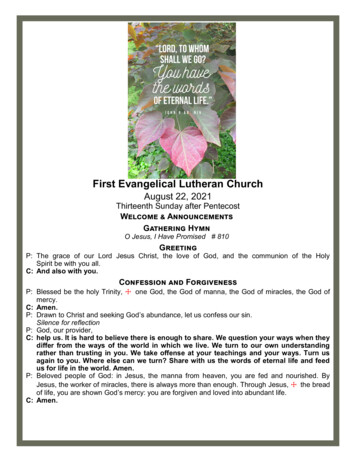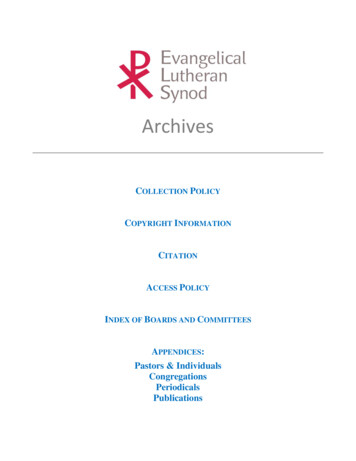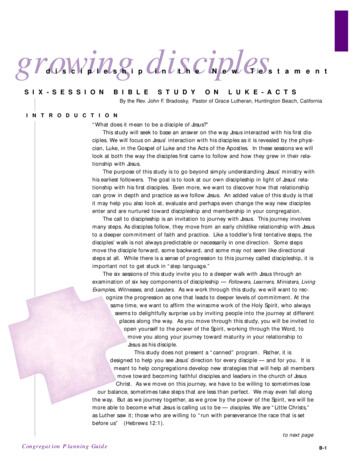
Transcription
growing disciplesd i s c i p l e s h i pS I X - S E S S I O NB I B L Ei nt h eS T U D YN e wO NT e s t a m e n tL U K E - A C T SBy the Rev. John F. Bradosky, Pastor of Grace Lutheran, Huntington Beach, CaliforniaI N T R O D U C T I O N“What does it mean to be a disciple of Jesus?”This study will seek to base an answer on the way Jesus interacted with his first disciples. We will focus on Jesus’ interaction with his disciples as it is revealed by the physician, Luke, in the Gospel of Luke and the Acts of the Apostles. In these sessions we willlook at both the way the disciples first came to follow and how they grew in their relationship with Jesus.The purpose of this study is to go beyond simply understanding Jesus’ ministry withhis earliest followers. The goal is to look at our own discipleship in light of Jesus’ relationship with his first disciples. Even more, we want to discover how that relationshipcan grow in depth and practice as we follow Jesus. An added value of this study is thatit may help you also look at, evaluate and perhaps even change the way new disciplesenter and are nurtured toward discipleship and membership in your congregation.The call to discipleship is an invitation to journey with Jesus. This journey involvesmany steps. As disciples follow, they move from an early childlike relationship with Jesusto a deeper commitment of faith and practice. Like a toddler’s first tentative steps, thedisciples’ walk is not always predictable or necessarily in one direction. Some stepsmove the disciple forward, some backward, and some may not seem like directionalsteps at all. While there is a sense of progression to this journey called discipleship, it isimportant not to get stuck in “step language.”The six sessions of this study invite you to a deeper walk with Jesus through anexamination of six key components of discipleship — Followers, Learners, Ministers, LivingExamples, Witnesses, and Leaders. As we work through this study, we will want to recognize the progression as one that leads to deeper levels of commitment. At thesame time, we want to affirm the winsome work of the Holy Spirit, who alwaysseems to delightfully surprise us by inviting people into the journey at differentplaces along the way. As you move through this study, you will be invited toopen yourself to the power of the Spirit, working through the Word, tomove you along your journey toward maturity in your relationship toJesus as his disciple.This study does not present a “canned” program. Rather, it isdesigned to help you see Jesus’ direction for every disciple — and for you. It ismeant to help congregations develop new strategies that will help all membersmove toward becoming faithful disciples and leaders in the church of JesusChrist. As we move on this journey, we have to be willing to sometimes loseour balance, sometimes take steps that are less than perfect. We may even fall alongthe way. But as we journey together, as we grow by the power of the Spirit, we will bemore able to become what Jesus is calling us to be — disciples. We are “Little Christs,”as Luther saw it; those who are willing to “run with perseverance the race that is setbefore us” (Hebrews 12:1).to next pageCongregation Planning GuideB-1
Bible Study on Luke-Acts continuedG O A L SF O RT H I SC O U R S EThrough this course and by the power of the Holy Spirit, you will: Engage the Word (especially in Luke and Acts) as it reveals how Jesus’ followersmoved from being new partners to becoming maturer disciples. Hear and respond to Jesus’ invitation to follow and to move into a commitment ofgrowth in discipleship. Consider the implications of the invitation to strengthening the discipleshipministry of your congregation as it reaches out to and includes new believers.K E YA S S U M P T I O N S Making Disciples is the central mission of the church of Jesus Christ. Jesus’ finalinstruction and command in the Gospel of Matthew is “Go therefore and make disciplesof all nations, baptizing them in the name of the Father and of the Son and of the HolySpirit, teaching them to observe all that I have commanded you; and lo, I am with youalways, even to the end of the age” (Matthew 28:19-20). Every other ministry weattempt depends on our faithfulness in fulfilling this first command. The Gospels tell the story of Jesus “making” disciples. Through his interaction withthe first disciples, he gave us the model for how people are invited to become disciplesand grow in their discipleship. The way Jesus brought his followers into mature discipleship has several key components. Those six key components are: Followers, Learners, Ministers, Living Examples,Witnesses, and Leaders.As we understand how Jesus called and led his first disciples, we can follow that journey to renew our own discipleship and use it as a model for how people are invited togrow in discipleship within our own faith communities. The goal of this study is tomove us to action. Jesus has called us to “go and make disciples.” The call is urgent.Jesus invites you to move forward toward maturity in your life as a disciple so that youcan be all that Jesus meant you to be. As you live out your discipleship and as you workwith others in your congregation, you can continue to invite others into the joyfuljourney of a growing relationship with Jesus.N O T E ST OT H EL E A D E RAs leader, you play an important role in this study. You will be responsible to plan thesessions, make sure resources are available to participants, guide the discussion in orderto cover the material, encourage participation by all, help summarize learning, andhelp to carry through on any possible actions that may arise from your study. You donot need to be a pastor or church professional to lead this study—but some previousexperience in leading small group studies will be helpful.B-2T E A C HT H EF A I T HI N I T I A T I V E
A U D I E N C EThe course is meant to help congregational leaders and members come together tostudy Scripture in order to grow in their own discipleship and to look at how peoplegrow in discipleship in your congregation. Any group of youth and/or adults in thecongregation could benefit from this study. The most productive study, however,might be done by those who have responsibility for discipleship in your congregation— congregation council, education and/or evangelism committee and others.P R E P A R A T I O N Be sure you make a copy of this guide for each participant. Making these availablebefore your first session and encouraging all to read through the guide ahead of timecan enrich your discussion. You might assign one person to lead opening and closing prayers or worship. You might assign a session to individual participants (or participants working inpairs). Encourage participants to become as familiar as possible with the material theyhave been assigned. They might do additional research on the ideas in the session,using commentaries or other study resources. They might write or summarize their discoveries in their own words, interview people in the congregation about the discipleship issues raised in the session, write discussion questions relating to the session, orbring someone who is an “expert” in the area that the session covers to your class session. Invite the pastor, congregational leaders, or others who could enrich your discussion, especially during specific sessions.T H ES E S S I O NP L A NThis course is designed to be done in six consecutive sessions of 60-90 minutes each. Ifyou are working with 60 minutes or less, you will find more material in each sessionthan you can cover. Choose those items that seem most important for your discussionduring your class session. Encourage participants to read over, think through and discuss with others the remaining materials between the sessions. Don’t try to discuss every question. Choose those that seem important for yourgroup. Don’t press for “right” answers. Encourage all to express their insights andunderstanding. Return often to the focus of the session — the key component of discipleship. Helpparticipants come to a better insight about how they are living out that discipleshipcomponent in their own lives. Keep the tone of the study encouraging. The purpose of the study is not to shamepeople into acting more like a disciple or to make them feel guilty over failed attemptsin the past. Through this study, participants should be encouraged to open themselvesto the work of the Holy Spirit and to rededicate themselves to living as a disciple inways that connect with their own lives. Not everyone will come to the same understandings, make the same commitments or carry through in the same way. Our task isto encourage one another in our discipleship journey.Congregation Planning Guideto next pageB-3
Bible Study on Luke-Acts continuedT H ES E S S I O NP L A NcontinuedEach session follows this pattern: F O C U S The key theme for the session. P R A Y E R Use the prayer suggestions or other petitions from the group. Taketurns leading the prayers for each session. O P E N I N G D I S C U S S I O N The questions in this section will help start a conversation and move participants into the focus of the session. If you have more than 68 participants, you may want to break into smaller groups to reflect on the questions. Iftime is short, you may want to select only one or two of the questions, or you maywant to develop a question that is even more appropriate for your setting. S E A R C H I N G S C R I P T U R E In this section you will find a way to study theScripture passages at the heart of the lesson. Move through this material one sectionat a time, reading the Scripture texts, reading and reflecting on the material in thisguide, and talking about the questions as you have time. K E Y C O M P O N E N T O F D I S C I P L E S H I P By naming and defining eachcomponent, participants will be able to evaluate their own journeys as disciples. Youmight also use the definition to evaluate the way your congregation provides opportunities and encouragement for each person to grow as a disciple. M O V I N G T O W A R D A C T I O N This section invites the question, “Sowhat?” What difference does it make to know and understand this material? Whatneeds to change in my own life? How will our study group change as a result of thisdiscovery? What needs to change in our corporate ministry as a congregation to insureour ability to “make disciples” and lead others into this dynamic, life-transformingprocess? C L O S I N G Pray each week for the Holy Spirit to bring clarity of understanding tothe process of discipleship. Pray for participants as individuals, the study group andyour congregation. Pray for courage and strength to make the needed changes thatbecome obvious as a result of the study. P R E P A R I N G F O R T H E N E X T S E S S I O N Each week participants will beasked to read biblical material for the next session. They will also be asked to reflect ona carefully chosen quote by Dietrich Bonhoeffer from his book The Cost of Discipleship.“When the Bible speaks of following Jesus, it is proclaiming a discipleship which will liberatehumanity from all human dogmas, from every burden and oppression, from every anxietyand torture which afflicts the conscience . But does this mean that we ignore the seriousness of his commands? Far from it. We can only achieve perfect liberty and enjoy fellowship with Jesus when his command, his call to absolute discipleship, is appreciated in itsentirety.” (The Cost of Discipleship, Introduction, p. 37) Note:Some of Bonhoeffer’s quotes selected for this study have been altered to be more genderinclusive.B-4T E A C HT H EF A I T HI N I T I A T I V E
session oneT h ei n v i t e db e c o m ef o l l o w e r sF O C U S At its heart, discipleship is a series of relationships. The first relationship is the disciple’s relation-ship with Jesus. The second focus is the relationship between disciples. The final relationship that must beincluded in any New Testament study of discipleship is the relationship of the disciples to others. Each relationship begins the same way: with an invitation and a response.P R A Y E R Lord Jesus, as we consider how you began a relationship with your first disciples, help us to rememberhow our relationship with you began. We thank you for counting us worthy to be your disciples today, and forplacing us in this fellowship of disciples in this congregation and especially with those with whom we will sharethis study. We ask that your Holy Spirit would be at work opening our hearts and minds so that we might understand clearly how you made disciples and continue to make disciples today. May your Word bring us new insightand renewal. In Jesus’ name we pray. Amen.O P E N I N GD I S C U S S I O NTalk about one or more of the following: What is your definition of “disciple”? What does the word mean to you right now? What does it mean to you to say that discipleship is at heart a relationship? Talk about your style of forming relationships: Are you a person who offers the firstword or one who waits until another person comes to you? How do you handle rejection when you try to approach someone to begin a relationship and they do not respond?S E A R C H I N GS C R I P T U R E Read Luke 5: 1-11 and 27-29 aloud.1. Jesus had been preaching to the crowds, but the process of discipleship beginswith a focus on an individual. In the first case, the focus was on Peter and in the second example, it was Matthew. What is the significance of the fact that in each case Jesusmade the approach, rather than the other way around?2. In his calling of Peter, Jesus first issues a command: “Put out into the deep and letdown your nets for a catch.” How do you think Peter received that command? Why doyou think he did what Jesus commanded? In what way was this Peter’s first step in becoming a disciple?3. Peter expresses his sense of being overwhelmed by Jesus’ attention and care. ButJesus prevents Peter’s retreat with an even greater invitation. “Don’t be afraid, fromnow on you will be catching people.” What did Jesus mean by that invitation? Whatwas the result of that invitation for Peter?4. Jesus called Matthew (Levi), a hated Roman tax collector. Though he was ostracizedby fellow Jews, he had received power and authority from the Romans. He had financial security and protection. Why is Matthew an unlikely candidate for an invitation?5. Again, Jesus approaches. “Follow me,” he says. What do you think Matthew mighthave thought as Jesus invited him? What did Matthew do?to next pageCongregation Planning GuideB-5
Bible Study: Session Onecontinued6. Jesus did not call his disciples to come and merely observe, nor did he abandonthem once a relationship was begun. He called them to walk and stay with him. Basedon your study so far, what does it mean to be called and to live as a disciple?7. The setting for the calling of the first disciples is one that develops over the first fourchapters in the Gospel of Luke. As you examine those chapters for next week, you willdiscover again the amazing things that occurred prior to Jesus calling his first followers.Watch for the following pattern as you read.Jesus’ model for calling disciples includes: Focusing on individualsApproaching them directlyConversation that is sensitive to their needsInvitation or offer to followOpportunity for obedient responseResponse of amazement and wonder that invites others into the journeyWhat does this pattern say about Jesus and his disciples? What does it say about yourcall to be a disciple?K E YC O M P O N E N TO FD I S C I P L E S H I PDiscipleship begins with Jesus calling us into a relationship with him, invitingus to be his disciples and challenging us to respond with an act of obedience. Jesus has offered this invitation — not to agree with an idea or set of teachings, notto join an institution or organization. Jesus invites disciples to himself. There is only onething that attracts people. It is the one who issues the call: Jesus. Therefore, the call ofJesus is first and foremost an exclusive attachment to Jesus. How do we as individualsand as a congregation offer that call? The call to discipleship is a call to a relationship with the living Christ. The call isfreely given and the response is an act of faith. Faith is described in these texts as amatter of taking, by the power of the Spirit, the first step of obedience in followingJesus. The response is the evidence of faith. Dietrich Bonhoeffer writes, “Unless a definite step is demanded, the call vanishes into thin air and if people imagine that they can follow Jesus without taking this step, they are deluding themselves like fanatics.” Faith isinseparable from obedience. Whenever the call is made and the response is one of obedience, the Spirit has worked faith. What does the close connection between faith andobedience say about your faith life? What does it mean for the way the invitation is offeredto others through you and through your congregation? What does it mean to you to livethe “obedience of faith”?B-6T E A C HT H EF A I T HI N I T I A T I V E
M O V I N GT O W A R DA C T I O NDo or discuss one or more of the following: Tell how you received the call from Jesus. What did that call have to do with yourbaptism? Your confirmation promise? What was personal about that call? How do you show obedience to Jesus in your life? How can others tell you are following Jesus now? How do we offer invitations to other people to meet Jesus? Talk about the difference between inviting people to join an institution and the invitation to a relationship with Jesus. How are new disciples called, invited, supported and assisted in their relationshipwith Jesus and on their journey as disciples in your congregation? What might be doneto make that invitation and support more effective?C L O S I N GT H I SS E S S I O NThose who are hearing Jesus’ call to follow him for the first time might make a commitment to respond to that call through prayer and by continuing to study the Word.Members of the group might pray for and lay hands on those making that commitmentand promise to be with them throughout the study. Others could share and pray forhelp with things in their lives that need to change as they move toward mature discipleship.P R E P A R I N GF O RT H EN E X TS E S S I O NRead Luke, chapters 1-8. Note the pattern referenced on page 5 of this study guide.Think about the effect created by Jesus’ presence, teaching and action. Ask for volunteers to be responsible for the opening and closing prayers for the next session.“The call goes forth, and is at once followed by the response of obedience. The response ofthe disciples is an act of obedience, not a confession of faith in Jesus.”(The Cost of Discipleship, p. 57)Congregation Planning GuideB-7
session twof o l l o w e r sb e c o m el e a r n e r sF O C U S Disciples mature through basic training — a time for learning the essentials. Jesus is an available and transparent leader. Before disciples can know who they are, they need to know who he is. Onlythen are they equipped to understand his mission, purpose, methods and expectations.P R A Y E R Pray for wisdom and insight, an openness to learning, growing and being renewed in your relation-ship with Jesus. Pray for a new sense of personal identity as a disciple of Jesus. Pray for caring attitudes amongthose who are studying this material together. Pray for your congregation, that others would be open to becoming a congregation committed to a discipleship model for ministry.O P E N I N GD I S C U S S I O N Describe your most fulfilling experience in working on a team. How would youdescribe your relationship with the leader? What do you count on a leader to do? How important are the accomplishments of a leader in determining your level ofcommitment to a cause? What are the benefits of a close, personal relationship with a leader? What can bethe downside of that relationship?S E A R C H I N GS C R I P T U R E Read Luke 9:18-20 aloud.1. The disciples were on hand as Jesus taught the large crowd that had been followinghim. They had just experienced the feeding of the five thousand with the five loavesand two fish they offered to him and watched him bless. What do you think the crowdswere talking about after the feeding? What might they have been saying about Jesus?2. After a time of prayer, Jesus asks them a leading question: “Who do the crowds saythat I am?” What are the answers?3. Jesus asks, “But what about you? Who do you say that I am?” Why is that the singlemost important question a disciple of Jesus can answer? How would you answer that question? Where would your answer come from?B-8T E A C HT H EF A I T HI N I T I A T I V E
4. We will look at what the Word reveals concerning the identity of Jesus. (You mightdivide into smaller discovery teams to share the exploration of these 14 biblical references.) The question to be answered, after investigating each text, is: “What does thistell us about who Jesus is?” Write your responses and share them with the group.Luke 1:30-33Announcement of his birth (Who is he?)Luke 2:8-12Proclamation to the shepherds (Who is he?)Luke 3:21-22A voice at his baptism (Who is he?)Luke 4:13Confronting evil (Who is he able to face and resist?)Luke 4:17-21A prophesy (Who does Jesus claim to be?)Luke 4:34-37A word from the demons (Who do they say he is?)Luke 5:18-26He has power to heal and forgive (Who can do that?)Luke 6:5He is Lord of the Sabbath (Who is he?)Luke 6:20-49The teaching about the Kingdom (What is life like in theKingdom of God?)Luke 7:11-17His Word brings life to the dead (Who is he?)Luke 7:40-50What does Jesus say about forgiveness and faith?Luke 8:4-15How are we to live a productive life?Luke 8:21What does Jesus expect of those who are close to him?Luke 8:22-25Who is able to stop the winds and the waves?K E YC O M P O N E N TO FD I S C I P L E S H I PDisciples learn the basics.1. The disciples begin to learn, through experience and explanation, who Jesus is andhis mission — a mission that includes every disciple. Jesus deepens the relationshipwith his disciples by revealing to them the truth of his identity. Jesus is the Messiah,the Christ. He is “God with us.” How has your understanding of who Jesus is deepenedover time? What is the significance of being able to say that Jesus is God’s Messiah?2. All who follow Jesus as a disciple need to learn the basics. Only by knowing whoJesus is can we accept his power and his authority. Once we know and accept whoJesus is, we can grow in our ability to trust and follow him. What does our need toknow Jesus and his power have to do with our need to study the Word? How do you as anindividual and we as a congregation engage in “basic training?” What could be strengthened or revitalized personally, corporately?3. The basics of discipleship offer us a new view of reality. Through the process oflearning and observing, disciples begin to glimpse what Jesus was revealing: theKingdom of God. What does that new reality have to do with our lives right now?4. In accepting this new view of life, we are also leaving something else behind. It isthe way we used to view life. This is the beginning of the process of exchanging oneview of reality for another. It should come as no surprise that such a change will alsoinclude changes in behavior, attitude, habits, self-understanding, motives, etc. Whatare some of those changes as you experience them?5. Luther expressed the basics in this way: “Christ Alone,” “Word Alone,” FaithAlone,” and “Grace Alone.” What do those phrases mean to you? Why are they important as we seek to know who Jesus is and who we are as disciples?to next pageCongregation Planning GuideB-9
Bible Study: Session TwoM O V I N GcontinuedT O W A R DA C T I O NTalk about one or more of the following:What implications do these have for your life and the life of your congregation?1. How confident can you be about your basic training? Did you miss some of thefundamentals? What? How can you “catch up”?2. How well are members of our congregation trained in the basics of discipleship?What classes do we offer to review the basics?3. What opportunities for learning do we offer? What groups are being served? Whichare being missed? How can we reach more with opportunities to learn?4. What kind of learning opportunities do we offer for those new to the congregationor those new to the faith? What might they be looking for? What more could we do?C L O S I N GT H I SS E S S I O NThank God for calling you to be Jesus’ disciples. Give thanks for the opportunity thisstudy offers to grow and be strengthened in your faith. Invite those who have come tonew insights to share them. Let those who may be struggling or who have some confusion ask for support and openness to the teaching and guidance of the Spirit. Pray forthe Spirit’s strength to carry through on the changes you think Jesus is inviting you toconsider for your congregation as you invite and teach new disciples.P R E P A R I N GF O RT H EN E X TS E S S I O NRead Chapters 9-10 in the Gospel of Luke. Make a list of all the ministries of which youare aware currently underway through your congregation. Ask for volunteers to leadthe prayers for the next session.“The disciple is dragged out of his relative security into a life of absolute insecurity (that is,in truth, into the absolute security and safety of the fellowship of Jesus), out of the realmof the finite (which is in truth infinite) into the realm of infinite possibilities (which is the oneliberating reality).” (The Cost of Discipleship, p. 58)B-10T E A C HT H EF A I T HI N I T I A T I V E
session threeL e a r n e r sb e c o m em i n i s t e r sThe disciples were given basic training by knowing Jesus and understanding his mission. Thevision of the Kingdom of God Jesus presented, and Jesus’ teaching about the nature of that Kingdom,became real and tangible for the disciples as they observed his ministry. Then Jesus sent the disciples out todo exactly what he was doing. The process is the same for Jesus’ present-day disciples.FOCUSP R A Y E R Invite the Holy Spirit to be present and to open your hearts and minds so you can receive newinsights and understandings. Encourage each other to give the Holy Spirit access to your will so you willalso be open to new ways of acting, doing and speaking. Give thanks for each of the ministries of yourcongregation. Give thanks for the people involved in offering those ministries and those who are served.Ask for guidance to strengthen existing ministries and for opportunities to begin new ministries that willreach even more people.O P E N I N GD I S C U S S I O N Talk about the following: Tell about a time when you participated in a service project or helping experience.What did you do? How were you mentored? Who did it help? Why was it meaningfulfor you? What authority or power did you have to accomplish your goal? How did youreceive that authority? Did you know the people you were helping? How important is it for you to make a difference in this world? When you seepeople in need, what happens to your heart? What happened to your relationshipswith the people with whom you were working?S E A R C H I N GS C R I P T U R E Read Luke 9:1-6 and Luke 10:1-20 aloud.1. Jesus had been modeling ministry for the disciples. At first they were passiveobservers. Yet they were not observing from a distance. They were close enough tosee and hear Jesus’ method and the results as he preached, taught, healed and preformed miracles. The revealing of his power was for the purpose of giving it away.What do you think caused the disciples to stay with Jesus over the years of his ministry?2. Jesus calls his disciples together and then gives them power to heal, to drive outdemons and to preach. What were the disciples to do with the power or authority Jesusgave them?3. They are given specific instructions for this mission. The one giving the power andauthority also sets the boundaries. What are the boundaries? Why are they helpful?4. Having all they needed, the disciples responded obediently. They went out andpreached and healed. As they did so, they experienced the power of Jesus they hadobserved in him. Now they were touching the lives of people with his power.Through them, people heard about the Kingdom of God and began to experienceGod’s reign in Jesus. How do you think the disciples were received?to next pageCongregation Planning GuideB-11
Bible Study: Session Threecontinued5. The disciples stayed together, but moved from place to place just as Jesus haddirected them. Why was their report back to Jesus a cause for celebration?6. In Luke 10:1-20, Jesus increases the number of disciples who are on the mission.What was that mission? How was Jesus a model for that mission? Why do the 72 returnfilled with joy?7. Notice that Jesus’ model for empowering people for ministry includes:Giving people power, authority and promiseSending them with a purposeSetting boundaries for the missionAs they carry out the mission, the disciples: Experience the power of Jesus through them to others Stay together Report and celebrate the resultsWhat does that model say about the way we are to carry out mission both individually andas a congregation?K E YC O M P O N E N TO FD I S C I P L E S H I PJesus sends his disciples out to do ministry in his name. The power andauthority of Jesus they observed is now given to them.1. Another change occurs in the life of the disciples as they make the transition fromobserving Jesus and his ministry to participating in that ministry. Certainly, their experiences and learning helped them mature in their faith in Jesus. Beyond that, they alsogrew in their relationships with one another. What evidence of that growing relationshipdo you see?2. The disciples also grow in their relationship with those outside their g
can grow in depth and practice as we follow Jesus. An added value of this study is that it may help you also look at, evaluate and perhaps even change the way new disciples enter and are nurtured toward discipleship and membership in your congregation. The call to discipleship is an invitation to journey with Jesus. This journey involves many .
